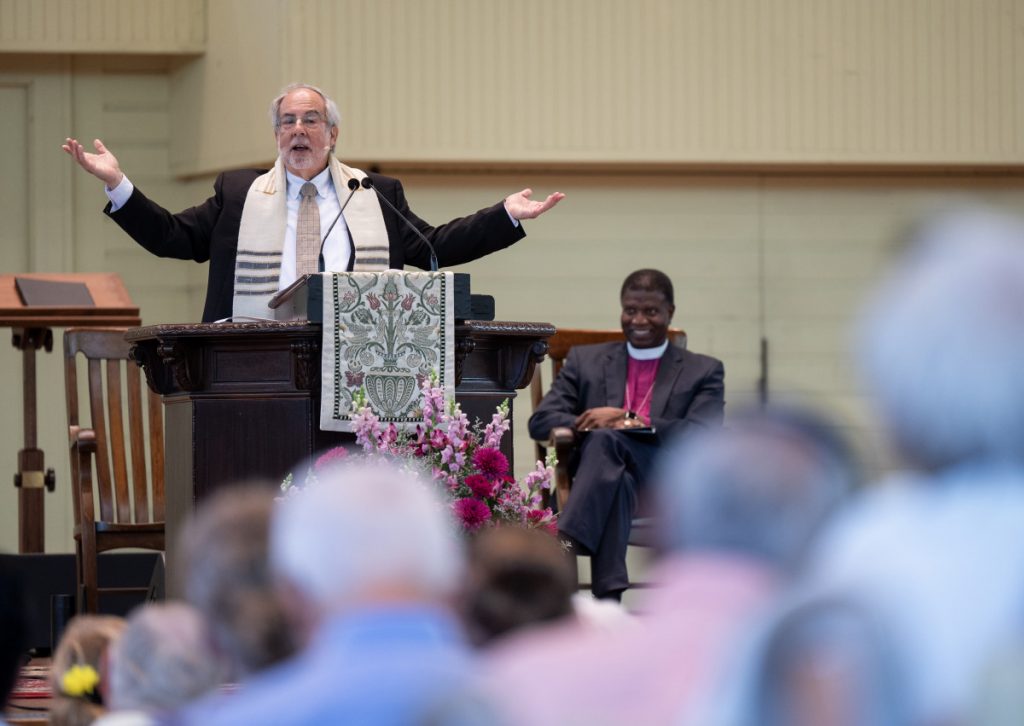
Column by Mary Lee Talbot
Rabbi Ed Feinstein grew up watching 1950s television. So perhaps it was appropriate that his final sermon for Week Nine was recorded and shown to the congregation in the Amphitheater. Feinstein and wife, Rabbi Nina Bieber Feinstein, had to return to California before the beginning of the Sabbath, leaving Chautauqua on Thursday night.
Feinstein preached via video at the 9:15 a.m. morning worship service in the Amp. The title of his sermon was “The Tyranny of the Normal.” The scripture reading was Micah 7:18-20. There was also a reading from This is Real and You Are Completely Unprepared: The Days of Awe as Journey of Transformation, by Rabbi Alan Lew, who was the rabbi at Congregation Beth Sholom in San Francisco before his death in 2009.
“When I was growing up, I wanted to be a Cleaver, a Nelson or an Anderson,” said Feinstein. He was referring to the television shows “Leave It to Beaver,” “Ozzie and Harriet,” and “Father Knows Best.”
He continued, “I wanted my dad to come home and hang his fedora on a hook like Ward Cleaver and he would be greeted by my mom like June Cleaver in high heels and pearls. I wanted an older brother like Wally Cleaver who wore a letter jacket and worked on cars. They never argued and there was no existential question that could not be solved by Ward’s wisdom and June’s cookies.”
Feinstein’s family was nothing like the Cleavers. They were loud, emotional, argued and their garage was filled with furniture from his Russian emigré grandparents. His aunts and uncles argued about unions, the Holocaust and Vietnam, bringing history into the house. “They had to fix the world, not cars,” he said.
“The tyranny of the normal — who sold us this map of life?” he asked. “On the inside I was an ethnic Jew, on the outside a normal American. The Cleavers were in black and white; my family was in glorious technicolor.”
The Feinsteins’ neighbors would join in for sabbath dinners and share the boisterous conversation over four desserts. “When I called home from college during shabbat dinner, my mother said, ‘Say hello to your friend Bobby.’ I said to Bobby, who is of Chinese background, ‘What are you doing there?’ He said, ‘You think my mom makes matzo ball soup?’ ”
He asked the congregation, who sets the standard for what is the right way to live, to love to be your right self? “We all have pictures of our kids in our wallets and when the kid does not follow the map on the back of the photo we yell at the teacher, take the kid to doctors, therapists, and then perform the greatest act of child abuse: disappointment.”
He asked, “We have pride for those who are all-stars, who excel at everything, but is there pride for the one with a difference? Can we see that one for who he or she is and appreciate their unique being? Do we have a place, off our map, for them?”
No one has everything put together. Everyone has moments of shame, failure or guilt that drive them off the map. No one, he said, expects a divorce, a disappointment at work, some kind of failure.
“No one’s life is television perfect,” Feinstein said. “There are people today who carry shame because their inner and outer lives do not mesh. They hide their secrets, don’t know their values and are drifting, not knowing where they belong.”
He urged the congregation to “listen to what our faith, what all our faiths, proclaim — we believe in a God of second chances, but first we have to let go of our shame and forgive ourselves. We have to release ourselves and those we love from the tyranny of the normal.”
This is the beginning of the season of repentance for Jews and it begins with a prayer, Kol Nidre, at the beginning of Yom Kippur services. Kol Nidre means “all vows” and it is a prayer to preemptively annul all vows made between the self and God so that one avoids the sin of breaking a vow to God.
“All maps are torn up, all expectations relinquished,” Feinstein said. “The prayer means we will not let the tyranny of the normal stand between us and God. Our failure is forgiven, our shame lifted and we are free to write our own maps, to be our own blessings.”
In the season of repentance, Feinstein said, “confess your shortcomings, the things you said and the things you left unsaid, the actions you made and the ones you had not done. Before you master this courage, before you are welcomed by your family and by God, you must forgive yourself and let go of the tyranny of the normal.”
He continued, “Then may the sacred gift of new life and the new year come to you, for a year of many, many blessings.”
Rabbi Samuel Stahl, an associate in the Department of Religion and rabbi emeritus of Temple Beth El in San Antonio, served as liturgist. The Rt. Rev. Eugene T. Sutton, senior pastor, served as co-liturgist. Arthur Salz, professor emeritus at Queens College, City University of New York, and former co-president of the Hebrew Congregation of Chautauqua, read the scripture and part of an essay by Rabbi Alan Lew. The prelude was “Sarabande Op. 8,” by Joseph Sulzer, played by Joshua Stafford, director of sacred music and Jared Jacobsen Chair for the Organist on the Massey Memorial Organ. For the anthem, the Motet Choir sang “With A Voice of Singing,” by Martin Shaw, under the direction of Stafford and accompanied by Nicholas Stigall, organ scholar, on the Massey Memorial Organ. Stafford played “Toccata,” from Symphony No. 5 by Charles-Marie Widor, on the Massey Memorial Organ. Support for this week’s chaplaincy and preaching was provided by the Daney-Holden Chaplaincy Fund and the Samuel M. and Mary E. Hazlett Memorial Fund.




